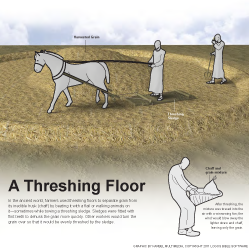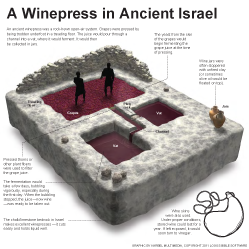2:1–17 The prophet continues to describe the chaos and cosmic upheaval accompanying the Day of Yahweh, depicting the invading locusts as an unstoppable army led by Yahweh. The terrifying judgment elicits another call for repentance as the priests intervene with Yahweh, pleading that the people be spared. |
2:1 Blow the trumpet The trumpet was blown to warn of impending danger (see note on Jer 4:5).
Zion Refers to the Temple Mount and, by extension, Jerusalem. Zion was envisioned as Yahweh’s sacred dwelling (see note on Isa 2:2).
the day of Yahweh See note on Joel 1:15.
2:2 A day of darkness and gloom Darkness is a typical element in the description of the Day of Yahweh (see note on Ezek 30:3; compare Zeph 1:15; Amos 5:18–20).
2:3 Before them a fire devours Fire is a common image for divine judgment (see note on Isa 4:4).
the garden of Eden Alludes to the lush, verdant growth of Yahweh’s initial creation (Gen 2:8–9; see Isa 51:3 and note). Compared to the devastated land the locusts left behind, the land they have not yet touched looks as perfect as Eden.
2:5 like a strong army Invading armies are often likened to locusts; here, locusts are instead compared to an army. See Joel 1:6 and note.
2:10 Before them the earth quakes Imagery of cosmic upheaval accompanies many descriptions of a theophany (compare Isa 13:13 and note).
2:11 And Yahweh utters his voice before his army Placing Yahweh at the head of the locust army connects the natural disaster with divine judgment.
Who can endure it Compare Mal 3:2.
2:12 return to me with all your heart Compare Joel 1:13–14. Yahweh calls on His people to return and give Him undivided devotion. Even in the face of impending doom, the prophets regularly called for repentance with the hope that God would relent from the predicted judgment (compare Jer 4:1; Hos 12:6).
2:13 Rend your hearts and not your garments Compare Jer 4:4 and note. Internal spiritual brokenness is more important than the outward act of tearing one’s clothes, which was a sign of mourning (see Gen 37:29).
gracious and compassionate This phrase is central to ot descriptions of Yahweh, highlighting His grace, mercy, patience, and loving kindness as the attributes by which He defines Himself (Exod 34:6).
2:14 Who knows Reflects hope that there was still time to avoid judgment (compare Jonah 3:9).
2:15 Blow the trumpet in Zion Compare Joel 2:1. This time, the signal is calling for an assembly, not warning of danger.
sanctify a fast Compare 1:14.
2:16 consecrate the assembly Everyone is called out for this assembly. See 2 Chr 20:13.
2:17 colonnade The court in front of the temple. The location described is the traditional spot for interceding before Yahweh (see 1 Kgs 8:22).
the priests The temple priests are the ones offering the prayer of intercession on behalf of the people.
Where is their God The disaster that befell Israel would make the surrounding nations believe that Yahweh had abandoned them. This language is typical of laments (Pss 42:3; 79:10; 115:2).
2:18–3:21 Yahweh answers the people’s prayers in the second half of the book (see note on Joel 1:1). The promised restoration reverses the economic devastation from the locust invasion and offers assurance of a future day of judgment when Yahweh will punish the nations and renew Israel. The shift from a plea for deliverance to a statement of assurance is typical in lament psalms. |
2:18 Then Yahweh became jealous The transition in v. 18 is marked by the use of the Hebrew narrative past tense to introduce Yahweh’s answer.
became jealous for his land In this context, Yahweh’s jealousy is in concern for His own reputation. The nations questioned His ability to take care of His people in v. 17 (compare Ezek 39:25; see note on Isa 48:19, and note on Ezek 20:9).
2:19 grain, new wine, and olive oil Responds directly to the lament in Joel 1:16–17 about the crop failure caused by the locusts.
a disgrace among the nations Responds to the plea in v. 17. The two verses are linked by their use of the word cherpah, often translated as “disgrace,” “reproach,” or “mockery.” See note on Ezek 22:4.
2:20 The northerners The identity of the northerner is unclear; it may be locusts or an invading army.
the eastern sea The Hebrew expression here may refer to the Dead Sea on the southeast side of Judah or the Persian Gulf on the eastern side of the Arabian Peninsula.
the western sea The Mediterranean Sea is described in Hebrew as the western sea. Locust swarms were often pushed out to sea by powerful eastern winds coming off the desert—the same prevailing winds that pushed them into Palestine in the first place.
stench The smell of millions of dead locusts is likened to the stench of corpses from Yahweh’s defeat of Israel’s enemies (compare Isa 34:3).
2:22 the pastures of the desert have put forth new green shoots The renewal of creation is a common element in oracles of restoration. Salvation is envisioned as a reestablishment of the ideal conditions of Yahweh’s initial act of creation (compare Isa 35:1–10 and note).
the fig tree and the vine have yielded their produce Compare Zech 8:12. A reversal of the destruction described in Joel 1:7.
2:23 the autumn rains for your righteousness The Hebrew term here primarily expresses righteousness, and can sometimes also express related concepts such as vindication. Context suggests Yahweh’s generosity and faithfulness in renewing the usual cycle of rain (compare Hos 10:12).
the autumn and spring rains The rainy season in Palestine begins in the autumn and runs until spring. In Hebrew, the autumn rains are the “early rain,” and the spring rains are the “latter rain.” These rainy seasons were crucial for the agricultural cycle. Grain was harvested in the spring and processed in the summer.
2:24 threshing floors Areas for removing kernels of grain from their stalks and husks.
and the vats will overflow with new wine and olive oil Grapes were harvested in the fall; olives were harvested in the fall and early winter.
2:25 the locust The same words for locusts as used in Joel 1:4 (see note on 1:4).
2:28–32 This five-verse section stands as a separate chapter in the Hebrew text. The abundance promised with Yahweh’s restoration in vv. 18–27 is amplified through a promise that all of God’s people will receive the blessing of His Spirit and witness His coming on the future Day of Yahweh, when He comes to judge all people. |
2:28 I will pour out my Spirit Compare Isa 32:15; Ezek 39:29. The Spirit of Yahweh was an expected part of future redemption.
and your sons and your daughters will prophesy Alludes to a state of prophetic exhilaration brought on by the Spirit of Yahweh. See note on Ezek 11:5.
2:30 I will set wonders in the heavens Echoes earlier descriptions of the cosmic upheaval that will accompany the Day of Yahweh (see note on Joel 2:10).
2:32 everyone who calls on the name of Yahweh Quoted by the Apostle Paul in Rom 10:13.
there will be those who escape Compare Obad 17.

|
About Faithlife Study BibleFaithlife Study Bible (FSB) is your guide to the ancient world of the Old and New Testaments, with study notes and articles that draw from a wide range of academic research. FSB helps you learn how to think about interpretation methods and issues so that you can gain a deeper understanding of the text. |
| Copyright |
Copyright 2012 Logos Bible Software. |
| Support Info | fsb |
 Loading…
Loading…




